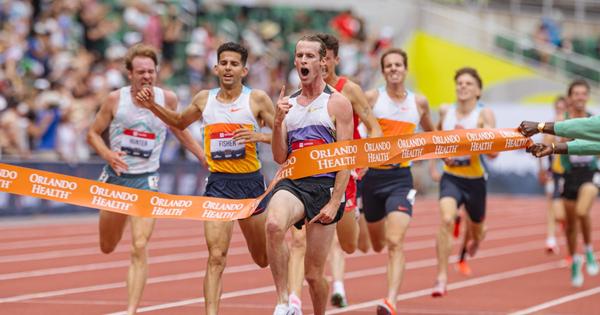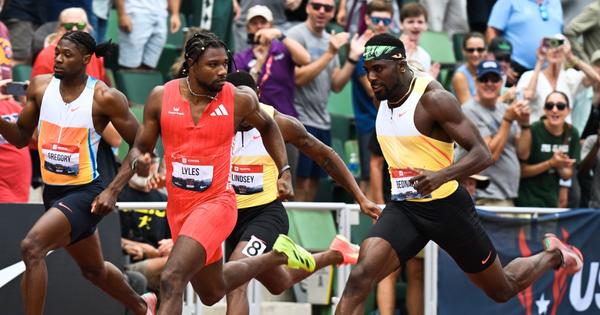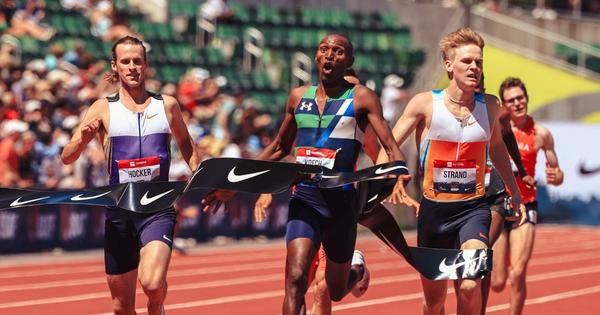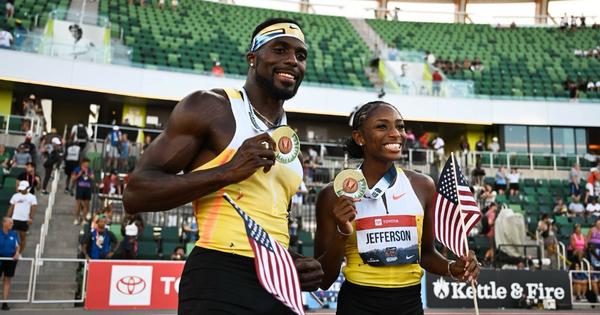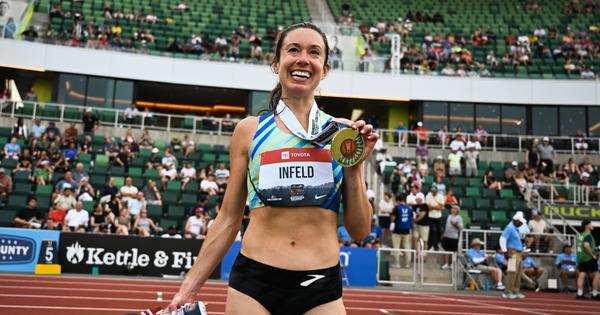By David Melly
August 6, 2025
Wow. Where to begin?
The 2025 U.S. Outdoor Championships were held last weekend. A couple hundred of the world’s best runners, jumpers, and throwers schlepped to and from Eugene, Oregon, to make their bids for a spot on Team USA for next month’s World Championships. A lucky few athletes in each event will be heading to Tokyo; countless more are going home devastated.
But boiling down this weekend of track and field into a laundry list of results barely scratches the surface of everything that went down. This was truly one of the most zany, unpredictable track meets we can remember, and the fact that it happened at a national championship only makes the outcomes more mind-boggling.
Here’s a crazy stat: Only 11 of the 38 events saw the 2024 national champion defending their title. There was more predictability on the women’s side, but just four men (Noah Lyles in the 200m, Rai Benjamin in the 400m hurdles, Kenneth Rooks in the steeplechase, and Curtis Thompson in the javelin) won their events both years. Some of that is undoubtedly due to the ability of reigning World champs to exercise their wild card bye and skip the final, like Grant Holloway in the 110m hurdles and Sha’Carri Richardson in the 100m. But given how they looked in the rounds they did run, victory was far from assured even if they had toed the line.
We didn’t get any world records this time around (at least on the senior level—more on that soon) but fans both in-stadium and at home got something arguably better. Good ol’ fashioned, edge-of-your-seat, see-it-to-believe it sports drama, where the script-writers took the odds-makers to task and decided to deliver upsets, twists, and theatrics in droves.
If all you watched this year was the Diamond League, you’d be shocked to learn that Josh Hoey, Trayvon Bromell, Addy Wiley, and Trey Cunningham all missed the team. And if all you watched was NCAAs, you’d be equally gobsmacked to see that T’Mars McCallum, Evie Bliss, and Ethan Strand did, given that they didn’t even win against collegiate competition one short month ago.
Despite putting out over 30,000 written words on USAs already across the CITIUS MAG channels, plus hundreds of social media posts, interviews, and literal days of podcasting, there’s plenty more to say, as the benefit of hindsight gives us a little more time to reflect and unpack a truly nutso weekend out West.
A little spice is good for the sport.
If any highlight from USAs spilled out into the broader sporting world, it was surely the physical and verbal altercation between 200m champ Noah Lyles and runner-up Kenny Bednarek. There’s a long backstory to this one that involves burner Twitter accounts, girlfriends, phone calls (or lack thereof), and a lot of “no comment” comments from the athletes themselves, but the official Lap Count take on all of this is: hell yes.
Generally speaking, it’s nice that track and field is a friendly sport full of friendly people. But the idea that the two fastest guys in the world this year can’t stand each other, but have to race a few more times this season—even as part of the same relay—is going to deliver tension, energy, and eyeballs to the sprints like never before. The Silesia Diamond League is bringing Lyles and Bednarek back together with the addition of Olympic silver medalist Kishane Thompson next week, and you can bet your last dollar all eyes in that stadium and millions (hopefully) around the world will be glued to that finish line.
It goes without saying that professional athletes really want to win, but wanting to win is very different from wanting to beat someone. And that kind of contentious vibe makes things more exciting where otherwise the narrative is simply Lyles going for his fourth straight World title.
Only two of ten distance races went according to form.
The distance events were particularly topsy-turvy this time around. Olympic medalists like Yared Nuguse, Grant Fisher, and Athing Mu-Nikolayev were all denied U.S. titles, and even Olympic 1500m champion Cole Hocker lost his signature event but picked up a somewhat-surprising victory in the 5000m instead. The most predictable events were the women’s 1500m, where Nikki Hiltz won their sixth straight U.S. title in the event just ahead of 2022 champ Sinclaire Johnson, and the steeplechase, where Olympic silver medalist Kenneth Rooks won his third straight title, albeit after a rocky start to the year.
But beyond that, chaos reigned. After last year and the start to the season he’s had, you’d think Grant Fisher would be a lock for at least one gold in the 10,000m and 5000m—but no, thanks to Nico Young and Cole Hocker’s respective kicks, Fisher went home with two silvers. It’s a bit wild to look at Fisher’s resume and realize he only has three career U.S. titles; he’s inarguably been the country’s best long-distance runner of the decade so far, but someone else always seems to show up at just the right time.
Speaking of 10ks, near misses, and timing it just right… how ‘bout the return of Emily Infeld?? It’s not every day that a 35-year-old wins her first national title in this sport, but Infeld did just that, beating former teammate Elise Cranny to the line in the 10,000m in 31:43.56. Infeld, like Fisher, has long been a presence on the U.S. and international distance running scene, even winning World bronze in 2015, but she’d never won at USAs and, after finishing 16th in the 5000m final at Trials last year, it looked like perhaps she never would. We’ve never been happier to be wrong.
The men’s 1500m was equally unpredictable, and while one expectation did come to pass—a record-breaking fast final, won in 3:30.17—no one expected Cole Hocker, Yared Nuguse, and Hobbs Kessler all to be taken down by both Jonah Koech and Ethan Strand. Koech and Strand have the talent to make the team, to be sure, but both provided reasons for doubt as well. In Koech’s case, it was a long strip of KT tape on his hamstring and a month away from racing, and in Strand’s, the fact that he couldn’t win a title against only NCAA competition just seven weeks earlier gave prognosticators pause. Team USA put three men in the top five for a reason in Paris: Hocker, Nuguse, and Kessler are savvy championship racers with plenty of talent of their own. But this time, it’ll only be Hocker on the Team (Diamond League final results notwithstanding).
Packed into the distance results were full-circle narratives about comebacks (Donavan Brazier from three years of injury and Shelby Houlihan from a four-year doping ban) and long-awaited moments (OAC teammates Josette Andrews and Sage Hurta-Klecker making their first outdoor teams). However, the story of the meet is the meteoric rise of young talent in the 800m—but we’re not talking about Roisin Willis, although it was great to see the NCAA champ win her second title of the summer at Hayward a few short days before her 21st birthday.
Steps behind Brazier’s triumphant return to the top of the 800m ranks in a personal best of 1:42.16, 16-year-old Cooper Lutkenhaus came flying down the track with the fastest final 100m of the meet to set a new world U18 record of 1:42.27. One day earlier, Lutkenhaus was as shocked as anyone else just to make the final, but you wouldn’t know it by the way he vacuumed up the likes of Bryce Hoppel, Brandon Miller, and Josh Hoey on the homestretch. There are many insane stats about this race, but here’s some wide-angle perspective: Lutkenhaus, who will become the youngest member of Team USA to ever compete at a World Championship next month, is now the 18th-fastest 800m runner of all time.
Some of the best competition happened off the track.
…Off the track, and on the field that is. One of the most dramatic events of the meet was the women’s long jump final, where Olympic champ Tara Davis-Woodhall got through the first three rounds by the skin of her teeth after two fouls and then leapt a world-leading 7.12m to cement the win. Behind her, Claire Bryant claimed second with a fortuitous +2.1 wind. And the final spot on Team USA was decided by tiebreakers and final attempts, as both Quanesha Burks and Alyssa Jones recorded 6.90m jumps but Burks ended up third by virtue of a better second-best jump on her final attempt.
The men’s shot put was equally crazy, as the lead changed hands three times over the latter half of the competition, and twice in the final round. Joe Kovacs went from first to fourth and will miss his first U.S. team in a decade thanks to extremely clutch throwing from Tripp Piperi, Payton Otterdahl, and last but not least Josh Awotunde, who hit the World standard and a new lifetime best of 22.47m to move from fourth to first on his last attempt of the competition.
The worst part of USAs is when a fan favorite like Heather MacLean (1500m), Drew Hunter (5000m), or Vernon Norwood (400m) ends up a heartbreaking fourth place. One athlete’s heartbreak is another’s dream coming true, but that doesn’t make it any less tough to watch someone you’ve followed, rooted for, and become invested in over the years run out of real estate in the homestretch and end up on the wrong side of the podium.
But wait. As we mentioned last week, the late Worlds and early Diamond League final creates an alternate pathway to Tokyo, and in several key events, Team USA can pick up another wild card if it does not already have a reigning World champion. This is great news for Norwood in particular, as he and two of the three men ahead of him could all potentially win in the DL final Zurich. Some athletes, like Nuguse, have already openly targeted the DL final as their next big goal, and others, like Anavia Battle in the 200m or Grace Stark in the 100m hurdles, are already on the team but could unlock a spot behind them with a win in Zurich.
And now, as promised… let’s talk about Drew Hunter: Hunter is not currently in the DL final or World rankings quota, but all three athletes ahead of him are double-qualified and could scratch one event. Plus Nico Young has a potential shot at a Diamond League wild card—remember, the DL final for 5000m specialists is actually a 3000m, an event Young won at his lone Grand Slam appearance. We checked in with CITIUS MAG Europe correspondent Preet Majithia for more insight:
Though he does not currently have the standard, and is not in the rankings quota, his position should improve after USAs, and there are probably numerous athletes currently in the quota who will scratch. But he likely needs one more good performance to boost his ranking, either at a Diamond League (where a run at the standard likely wouldn’t be impossible) or at NACAC before the qualification window closes on August 24th.
If he gets himself into a quota spot then there are a few different routes by which he ends up at Worlds. Note that USATF must submit the team (including alternates) to World Athletics at the end of August, and if he does not make it into the quota, USAs fifth placer Cooper Teare would likely be submitted as the alternate instead.
1. If, prior to Worlds, any one of Fisher, Young or Hocker chooses to scratch the 5000m then Hunter would be in the team. If, during Worlds, one of the three entrants choose not to double back after their first event then Hunter could potentially step up as a replacement (although there is a cutoff by which the switch would need to be made, and it is currently unclear as to exactly when that would be).
2. If Young (or Fisher potentially) wins the Diamond League Final, then they would take a wild card spot, which would allow USATF to select a fourth athlete in the event, so Hunter would be in the team. This would then mean that Cooper Teare would likely be selected as an alternate.
This is all subject to the discretion of USATF but they have been good about honoring the order of finish at Trials/Championships in previous years, where possible.
All in all, USAs delivered the goods. It’s a shame those goods were inconsistently streamed and some of the best moments were behind one or more paywalls, as this was truly an entertainment product worthy of extensive television coverage. And while we were certainly excited for the 2025 World Championships already, the repercussions of this roller-coaster meet only added to the hype ahead of the Big Show in Tokyo.
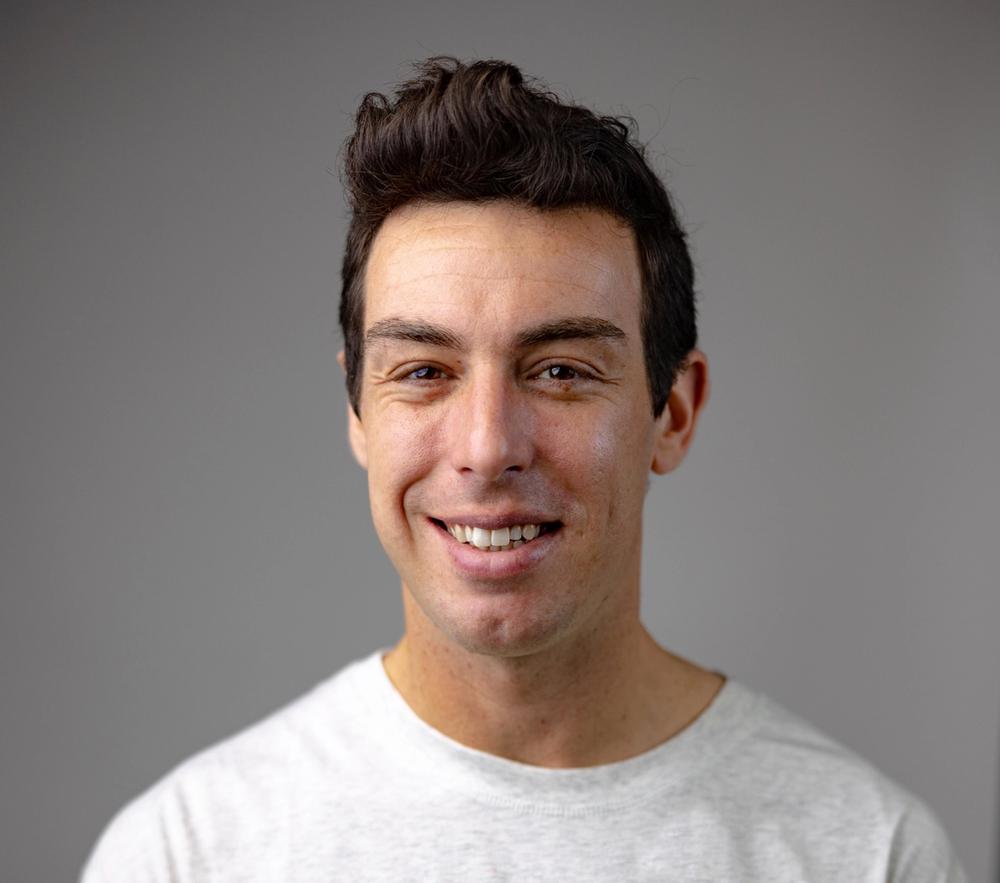
David Melly
David began contributing to CITIUS in 2018, and quickly cemented himself as an integral part of the team thanks to his quick wit, hot takes, undying love for the sport and willingness to get yelled at online.
